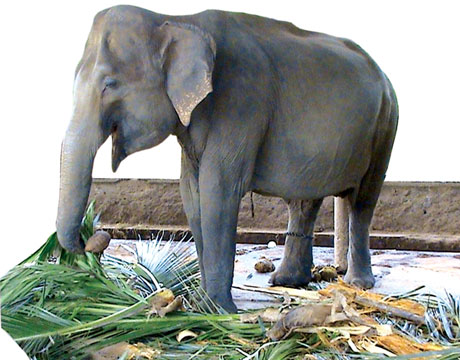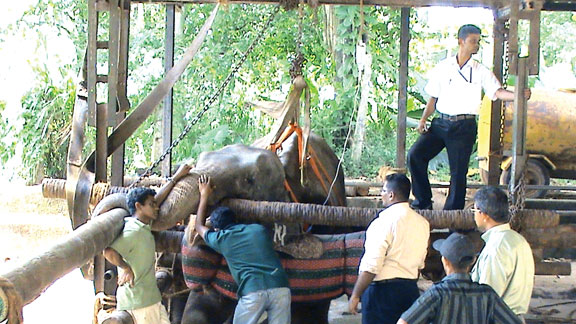|
Anuradha bids adieu:
A tragedy of elephantine proportions
By Dhaneshi YATAWARA
She was a mother of three and a grandmother too. Her eldest daughter
has one baby. She was a calm and quiet beauty of the elephant orphanage
at Pinnawala.
This giant beauty - Anuradha - is no more with us. She breathed her
last around 6.30 a.m. last Thursday at the age of 29. At the time this
edition went to print, the post-mortem was in progress at Pinnawala.
 |
|
The elephant before she
fell sick |
Led by Senior Lecturer at the Veterinary Faculty of the Peradeniya
University Dr. Asoka Dangolla, a team of senior veterinarians treated
Anuradha along with the veterinarians of the Pinnawala Orphanage and the
National Zoological Gardens, Dehiwala.
"As we identified, she was suffering from four problems and two were
serious. One was the Papilloma infection which was treated over the past
few days with the assistance of a native doctor as well. She responded
positively to that treatment, but her weak body condition finally
claimed her life", Dr. Dangolla said, explaining the treatment carried
out to save the animal. "Papilloma starts as an unnecessary tissue
growth and can be detected easily," Dr. Dangolla said.
Anuradha had suffered from a fracture on the left shoulder since
April last year and nearly two months later (in June) she was affected
with the Papilloma viral infection, resulting in a wart on her right
front leg. The Papilloma virus results in an epithelial growth on the
skin commonly known as warts.
Attacked by others
As the veterinarians explained, the Papilloma infection had severely
affected her and she also became weak due to the fracture. On April 26,
2010 Anuradha was attacked by another elephant in the herd, fracturing
her left shoulder, making her unable to bear her body weight. It proved
to be a deadly blow to her.
"I joined the team treating her, within the past two weeks, she has
been showing signs of weakness; giving birth to three calves could
surely have made her weak," Dr Dangolla explained.
"There are two ways to treat a wart in these animals; cut it off
until the skin bleeds or cut a large part of the wart and inject the
vaccine. Anuradha had not responded positively to the previous
treatment", he said.
Vulnerable to infection
Since the fracture, Anuradha has been standing with the support of a
structure made especially for her. "When elephants do not sleep flat on
the ground for more than two months, it drastically lowers their
immunity, making them vulnerable to severe infections," Dr. Dangolla
said.
According to veterinarians, elephants can sleep standing and they
tend to do so when they are sick or disturbed in their environment. Yet,
it is not total relaxation for the animal. Therefore, they do not get
the best results nature intended from sleep.
Anuradha had been given saline, with all vitamins and minerals as
well as glucose along with the medicine. As veterinarians explained
elephants can absorb glucose through their renal opening. "She ate well
until a week ago when we had to give her nutrition as injections and
through saline," Chief Veterinary Surgeon of the Pinnawala Elephant
Orphanage Dr. Chandana Rajapaksa said.
"We detected the wart, a white velvet - like growth in the upper
margin of her nail on the right leg. Her broken leg was healing but the
Papilloma was not answering to any of the medication," he said.
According to the veterinarian, the papilloma was growing while her
foot pad was decaying and becoming prone to secondary infections. The
Papilloma was cut off and a vaccine made using this wart by the
Veterinary Investigation Centre was injected to the affected area to
build resistance to the virus. Yet the animal had not responded well.
"She wasn't a prominent animal in her herd and always tried to be on
her own," Dr. Rajapaksa said. "We have seen herds, even in Pinnawala,
trying to keep weak animals away from them.
“This is actually natural behaviour even among wild elephants, as
these animals try to keep the healthier ones within the clan, ensuring
that only stronger genes are passed on to the next generation," he
explained.
"We need to keep an eye on such animals as they are open for attacks.
But once in a while, natural animal acts happen in seconds," he
explained.
Lack of nutrients
As Dr. Rajapaksa explained, a lack of nutrients during her infant
stage could have largely contributed to her weak condition. She was
found by officers of the Wildlife Conservation Department in Dunupotha,
Nochchiyagama in June 1982, abandoned and alone in the forest. She was
believed to have been just five months old then.
"When elephant calves are in such traumatic situations, we really do
not know whether they were properly fed with mother's milk. Sometimes we
are unaware of the plight of the mother as well. With proper nutrition
and care at the orphanage, they catch up, but sometimes early
deficiencies can have an impact on their physical condition," Dr.
Rajapaksa explained.
Anuradha grew up, gained weight and gave birth to three calves. She
gave birth to her first baby, Anuradhika, when she was about 11 years,
on November 15. Today Anuradhika herself is mother to one baby. Six
years later, on February 9, 1996 Wasabha was born. On May 28, 2005
Anuradha gave birth to another male calf, Asela. "Normally weak
elephants are timid by nature; it is one of the characteristics for us
to identify them," Dr. Rajapaksa said.
As he explained, such animals are given nutritional supplements with
extra vitamins and minerals. Anuradha had supplements since she was a
calf.
The nutrients differ from 10 years and above and the next level
changes after 20 years, according to Dr. Rajapaksa. Vitamins B complex,
C and E are vital for elephants along with other vitamins and minerals.
"We have especially made pellets to be given to herbivores such as
elephants and these are given to elephants living in the orphanage, with
special attention given to the weaker ones," he said.
 |
|
Anuradha being taken
care of by her keepers |
"We see Papilloma infection when the immunity of the animal drops
either due to under-nourishment or weakness due to illnesses. Elephant
calves that are found lost or abandoned in the wild, that are handed
over to the orphanage, sometimes come with such warts. We have mostly
seen these warts on their trunk, inside the mouth or near the tail," Dr.
Rajapaksa said.
Young ones cured
According to the veterinarians, warts due to Papilloma virus were
detected among several other elephants and they were treated without
delay. "Most of these animals are young and all are cured now," he said.
Raja, the old tusker of the Pinnawala orphanage, is under treatment and
responding positively towards the medication.
Despite the tireless efforts of a kind and loving team of
veterinarians and caretakers, today we have lost another valued member
of our shrinking elephant herd.
"The veterinarians had detected that Anuradha was pregnant at the
time of her illness, but we did not carry out an abortion as the
medicines used would further lower her immunity levels," said Bashwara
Gunaratne, Director of the National Zoological Gardens. "Our
veterinarians tried their best to save Anuradha. Yet, her weak nature
took over," he said.
Referring to the recent death of an elephant calf as a result of
drowning in the Ma Oya, Gunaratne said the Department is conducting a
thorough investigation and one mahout has been suspended until the final
verdict.
Amidst the complicated situations arising when caring for the largest
animal on earth, the Pinnawala orphanage is contributing its maximum to
save the elephant - the flagship species of Sri Lanka, he said. The
Department of National Zoological Gardens spent thousands of rupees per
day to treat Anuradha.
Since mid-April to early May this year, the Department had spent
nearly Rs.10,000 per day and since then the expenses had increased
between Rs. 30,000 to Rs. 55,000 on average per day. "Treating and
caring for animals is costly and need special expertise. “Since saving
the elephant is a national issue, we have never hesitated to take proper
action for the benefit of these animals," he said.
|

